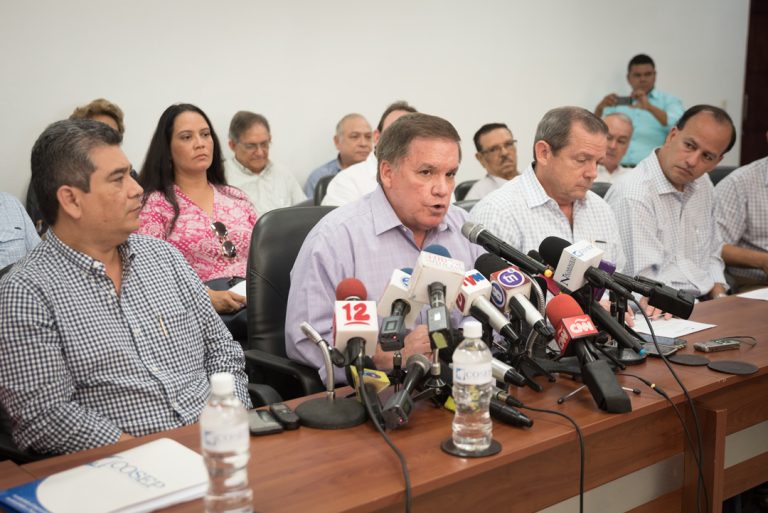15 de diciembre 2018

The Cuban Regime’s Punishment for Filming a Protest

PUBLICIDAD 1M
PUBLICIDAD 4D
PUBLICIDAD 5D
Letter to Ortega, headed by ten of the country’s business heavyweights, demands reforms and political dialogue.

Faced with the worsening political, social and economic crisis, the private sector demanded on Wednesday that Daniel Ortega accept dialogue to promote political reforms, including to convene fair and transparent early elections with a new Supreme Electoral Council (CSE). “Without a political agreement, there is no solution to the (national) crisis,” stated the country’s top business leaders.
Ten advisors of the Private Employers Council (Cosep), plus the presidents of 22 of the 27 chambers of this business association, plus the presidents of Cosep, AmCham and Funides, signed a letter addressed to President Daniel Ortega in which they reiterate what they already told him in their letter of last May 29th, then six weeks into the civic rebellion.
The new letter to Ortega has the signatures of ten leading businessmen of some of the main economic groups in the country: Carlos Pellas, Ramiro Ortiz, Jose Antonio Baltodano, Miguel Zavala, Juan Bautista Sacasa, Jaime Rosales, Jaime Montealegre, Alberto Chamorro, Cesar Augusto Lacayo and Miguel Gomez. The full text follows:
Mr. Daniel Ortega Saavedra
President of the Republic of Nicaragua
Mister President:
On May 29th, we in the private sector urged you to make all the efforts within your reach to find a solution to the political and social crisis facing the country, which at that time accumulated a balance of 70 deaths and hundreds of injured, and thus avoid further pain among Nicaraguan families.
Since then, with great sadness and pain, the number of Nicaraguans dead has increased considerably, and hundreds who participated in the protests or simply exercised their constitutional rights have been imprisoned and tried without due process. This situation has also resulted in the forced exile of thousands of compatriots in precarious human conditions.
In recent months, besides the significant deterioration of freedom of expression, of the press and mobilization, the economic consequences have been devastating. Already tens of thousands of Nicaraguans have lost their jobs, or are being forced to work in the informal sector or are limited to underemployment, which has resulted in the deterioration of the quality of life of their families.
This crisis has also caused enormous uncertainty and loss of confidence, leading to a dramatic reduction in economic activity, and an unprecedented contraction of the financial system, with a marked reduction in deposits and credits and a significant increase in the exchange rate risk. This is having an impact in the considerable reduction of national and foreign investment, with the consequent deterioration of the country’s risk ratings and therefore of the country’s image. The aforementioned has been accompanied by a reduction in support and the imposition of sanctions from the international community.
That is why, Mr. President, there is an urgent need for a negotiated solution among the different sectors, before the sociopolitical crisis and its economic effects deepen further, to the detriment of the entire country, and especially the neediest. The most representative sectors of society, including the Civic Alliance for Justice and Democracy, have expressed this urgency and willingness to be part of the search for a solution that takes into account what most Nicaraguans long for. However, it depends on the political will of your government for this to happen. Without a political agreement there is no solution to the crisis.
In this respect, in the private sector we reiterate that the solution must include resuming the electoral reforms agreed with the Organization of America States, with the advice and support of this organization to implement them. This would include changes in the composition of the Supreme Electoral Council, and the necessary steps to ensure the realization of free, fair, early elections, with independent national and internationally observation.
It is equally vital that the repression in the country cease. All freedoms must be ensured. A culture of true tolerance and reconciliation should be promoted where there is no room for messages that promote hatred and intolerance. On the verge of Christmas, Nicaragua should not have people imprisoned for exercising their fundamental rights. It is in your hands that we achieve reconciliation in the country based on a true culture of peace and justice where the results are visible to all.
Despite what we are experiencing, we continue to be a country with enormous potential. Once i the political actions that are aimed at restoring democracy, the rule of law and respect for human rights of all Nicaraguans allows us to regain confidence and certainty, we as the private sector are willing to work for the socio-economic recovery and together we can build a future where we can achieve the equitable and sustainable development we want for our country.
Finally, Mr. President, we believe and reiterate that dialogue is the way to solve problems and make the changes that must be accepted by the majorities. In this sense, we make our own the words expressed on the Advent message of the Episcopal Conference of Nicaragua: “with dialogue there is future, without it all efforts lead to failure. We reaffirm our conviction that dialogue is the peaceful way out of this sociopolitical crisis.”
—–
For our readers who understand Spanish:
Business Executives to request permission to march
The business executives meeting on Wednesday announced that they will request permission to hold a march to demand the release of political prisoners, cessation of repression, and early elections with national and international observation, reported 100% Noticias.
The legal teams of Cosep, AmCham and Funides will make the request for the demonstration.
No civic group has been granted permission to hold a march since September when the government said it would no longer allow any public opposition activities. The Police made it clear that only pro-Ortega rallies would be allowed.
The private sector says that without a political agreement there is no solution to the crisis in Nicaragua, and do not rule out a national strike.
Neither do they rule out the potential impact of the crisis on the Free Trade Agreement (FTA) with the United States and the European Union.
Archivado como:
PUBLICIDAD 3M
Periodista nicaragüense, exiliado en Costa Rica. Durante más de veinte años se ha desempeñado en CONFIDENCIAL como periodista de Economía. Antes trabajó en el semanario La Crónica, el diario La Prensa y El Nuevo Diario. Además, ha publicado en el Diario de Hoy, de El Salvador. Ha ganado en dos ocasiones el Premio a la Excelencia en Periodismo Pedro Joaquín Chamorro Cardenal, en Nicaragua.
PUBLICIDAD 3D